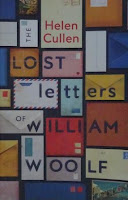'The Lost Letters of William Woolf' by Helen Cullen
There's a growing trend in publishing for charming and uplifting tales of ordinary people experiencing extraordinary things. These stories are becoming bestsellers, so it's not surprising that publishers are on the lookout for the next 'Unlikely Pilgrimage of Harold Fry' or 'Eleanor Oliphant is Completely Fine'. One such hopeful is the debut novel of Helen Cullen, 'The Lost Letters of William Woolf'.
William Woolf is one of 30 'letter detectives' at the Royal Mail 'Dead Letters' depot in East London. Every day, sackfuls of lost letters find their way to the depot thanks to smudged ink, missing labels and illegible handwriting. The detectives try to solve their mysteries and get them back on their way, but too often the search proves fruitless and the only place the letters can go is the industrial shredder. As William worries about his failing marriage and stalled writing ambitions, he becomes obsessed with a series of letters sent to 'My Great Love'. Written by a young woman to the soulmate she has yet to meet, William is struck by the hope and yearning of her words and dares to wonder if they were meant for him all along...
I really wanted to like this book. Once upon a time, I processed undeliverable mail for a large organisation and I always thought it would be a fantastic set up for a story, so was really interested to see what Cullen had done with it. Unfortunately, despite it being the dominating feature of the blurb, it's almost incidental to the story. It's a means to an end rather than what the story is about, which makes the promo a bit misleading.
The real story is of William's relationship with his wife, Clare, and the midlife crisis that's about to hit their marriage. They're both in their 30s, life hasn't quite turned out how they'd expect, with disappointments and misunderstandings on both sides, and everything is about to come to a head. This is the far more interesting part of the story, so I'm a bit perplexed as to why Clare doesn't even get a mention in the blurbs.
'The Lost Letters of William Woolf' started well (there's a lovely meet cute about how William and Clare found each other at university and we get perspectives on their marriage from both sides, as well as descriptions of the Dead Letters Depot and its staff that chime for anyone who has worked in an office.), but I had to drag my way through the second half of the book. I just couldn't get interested in the story behind the 'My Great Love' letters. It felt like padding, a distraction and contrived. After all, if William had really believed that they were destined for him, I bet a letter detective with his 11 years' experience could've found the writer very quickly, if he'd really wanted to.
The 'My Great Love' plot line took up space that could've been better used with more stories of William's letter detective successes. Some of these sub-stories were beautifully executed and deserved better than they got. It would've made more sense for him to learn from those as he reflected on his relationship with Clare rather than making things worse by chasing a shadow. True stories of relationships should surely have had more power than an imagined one.
Perhaps I'm a cynic or perhaps my expectations are just too high, but all I know is that I really didn't click with 'The Lost Letters of William Woolf'. It felt like a missed opportunity to explore a real life experience that's not normally the subject of of fiction. (It's a known phenomenon that people are having mid-life crises earlier, having got to ten years after graduation and realised that they're not where they thought they'd be in life.) Instead, this book drifts to what feels like a half-baked mystery of little consequence or interest.
But while 'The Lost Letters of William Woolf' has wounded me, it might make other hearts swell. I'm sure it'll find a very loyal and loving audience, but, unfortunately, I'm not it. I'm looking forward to reading other people's reviews, though.
Now, what next...
'The Lost Letters of William Woolf' was published in July 2018 by Michael Joseph. This review is based on an uncorrected proof received free of charge from the publishers.
